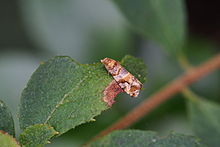Lobesia aeolopa
Appearance
| Lobesia aeolopa | |
|---|---|

| |
| Scientific classification | |
| Kingdom: | |
| Phylum: | |
| Class: | |
| Order: | |
| Family: | |
| Genus: | |
| Species: | L. aeolopa
|
| Binomial name | |
| Lobesia aeolopa Meyrick, 1907
| |
| Synonyms | |
| |
Lobesia aeolopa is a moth of the family Tortricidae first described by Edward Meyrick in 1907.[1] It is found in Vietnam,[2] Thailand, India, Sri Lanka, Myanmar, Java, the Solomon Islands, Korea, Japan, Taiwan, São Tomé and Príncipe, Tanzania, South Africa, Réunion and Madagascar.[3]
Biology
Larvae have been found on Ricinus communis, Melochia umbellata, Pluchea indica,[5] Lantana camara, Cajanus indicus, Gleditsia triacanthos and Flacourtia indica, but are possibly predatory on aphids, rather than feeding on plant tissue.[6][7]
References
- ^ "Species Details: Lobesia aeolopa Meyrick, 1907". Catalogue of Life. Retrieved 29 July 2018.
- ^ Razowski, J., 2009, Tortricidae from Vietnam in the collection of the Berlin Museum. 6. Olethreutinae (Lepidoptera: Tortricidae) SHILAP Revista de Lepidopterología 37 (145): 115-143.
- ^ New records and known species of the tribe Olethreutini (Lepidoptera: Tortricidae: Olethreutinae) from Thong Pha Phum National Park, Thailand Archived 2012-04-25 at the Wayback Machine
- ^ Japanese Moths
- ^ Diakonoff, A. (1982). "On a Collection of Some Families of Micro-Lepidoptera from Sri Lanka (Ceylon)". Zoologische Verhandelingen. 193: 1–124 – via Naturalis Biodiversity Center.
- ^ De Prins, J. & De Prins, W. (2018). "Lobesia aeolopa Meyrick, 1907". Afromoths. Retrieved 16 October 2018.
- ^ "Lobesia aeolopa Meyrick". ICAR-National Bureau of Agricultural Insect Resources. Retrieved 11 March 2017.
External links
